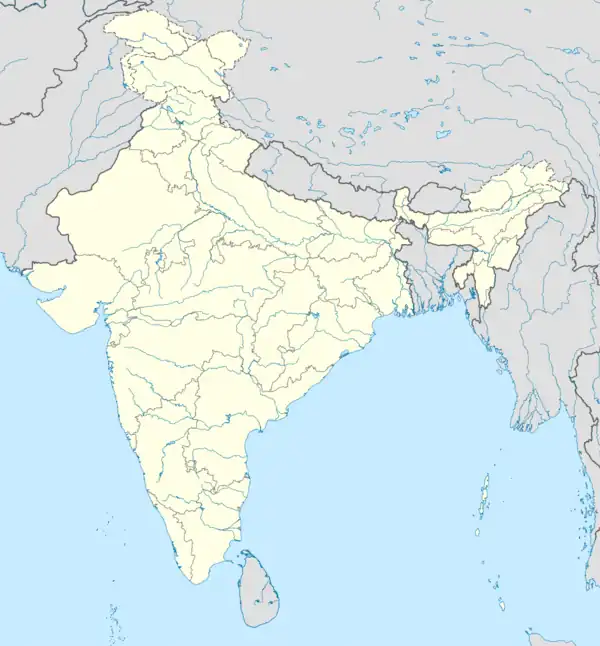Nabagram, India
Nabagram is a village in the Nabagram CD block in the Lalbag subdivision of Murshidabad district in the Indian state of West Bengal.
Nabagram | |
|---|---|
Village | |
 Nabagram Location in West Bengal, India  Nabagram Nabagram (India) | |
| Coordinates: 24°11′44.2″N 88°05′49.4″E | |
| Country | |
| State | West Bengal |
| District | Murshidabad |
| Population (2011) | |
| • Total | 6,939 |
| Languages | |
| • Official | Bengali, English |
| Time zone | UTC+5:30 (IST) |
| ISO 3166 code | IN-WB |
| Vehicle registration | WB |
| Website | wb |
Geography
M: municipal town, CT: census town, R: rural/ urban centre, H: historical place
Owing to space constraints in the small map, the actual locations in a larger map may vary slightly
Location
Nabagram is located at 24°11′44.2″N 88°05′49.4″E.
Area overview
While the Lalbag subdivision is spread across both the natural physiographic regions of the district, Rarh and Bagri, the Domkal subdivision occupies the north-eastern corner of Bagri. In the map alongside, the Ganges/ Padma River flows along the northern portion. The border with Bangladesh can be seen in the north and the east. Murshidabad district shares with Bangladesh a porous international border which is notoriously crime prone (partly shown in this map). The Ganges has a tendency to change course frequently, causing severe erosion, mostly along the southern bank.[1][2][3][4] The historic city of Murshidabad, a centre of major tourist attraction, is located in this area. In 1717, when Murshid Quli Khan became Subahdar, he made Murshidabad the capital of Subah Bangla (then Bengal, Bihar and Odisha).[5] The entire area is overwhelmingly rural with over 90% of the population living in the rural areas.[6]
Note: The map alongside presents some of the notable locations in the subdivisions. All places marked in the map are linked in the larger full screen map.
Civic administration
Demographics
According to the 2011 Census of India, Nabagram had a total population of 6,939 of which 3,535 (51%) were males and 3,404 (49%) were females. Population in the age range 0–6 years was 808. The total number of literate persons in Nabagram was 4,624 (75% of the population over 6 years).[9]
Education
Nabagram Amar Chand Kundu College was established in 2009 at Nabagram. Affiliated with the University of Kalyani it offers courses in Bengali and history.[10][11]
Healthcare
Nabagram Block Primary Health Centre functions with 15 beds at Nabagram.[12]
References
- "Types and sources of floods in Murshidabad, West Bengal" (PDF). Swati Mollah. Indian Journal of Applied Research, February 2013. Archived from the original (PDF) on 20 August 2017. Retrieved 15 August 2017.
- "District Census Handbook: Murshidabad, Series 20 Part XII A" (PDF). Physiography, Page 13. Directorate of Census Operations, West Bengal, 2011. Retrieved 24 July 2017.
- "Murshidabad". Geography. Murshidabad district authorities. Retrieved 24 July 2017.
- "Child labour, illness & lost childhoods, India's tobacco industry". Edge of Humanity Magazine, 27 December 2020. Retrieved 13 July 2021.
- "District Gazeteer" (PDF). (in Bengali) Chapter 3: History. Murshidabad District Administration. Retrieved 12 September 2017.
- "District Census Handbook, Murshidabad, Series 20, Part XII B" (PDF). District Primary Census Abstract page 26. Directorate of Census Operations West Bengal. Retrieved 2 July 2021.
- "District Statistical Handbook 2014 Murshidabad". Table 2.1. Department of Statistics and Programme Implementation, Government of West Bengal. Archived from the original on 29 July 2017. Retrieved 17 May 2017.
- "District Census Handbook: Murshidabad, Series 20 Part XII A" (PDF). Map of Murshidabad with CD Block HQs and Police Stations (on the fourth page). Directorate of Census Operations, West Bengal, 2011. Retrieved 27 August 2017.
- "2011 Census – Primary Census Abstract Data Tables". West Bengal – District-wise. Registrar General and Census Commissioner, India. Retrieved 15 September 2016.
- "Nabagram Amar Chand Kundu College". NACK. Retrieved 12 September 2017.
- "Nabagram Amar Chand Kundu College". College Admission. Retrieved 12 September 2017.
- "Health & Family Welfare Department". Health Statistics. Government of West Bengal. Retrieved 19 September 2017.
